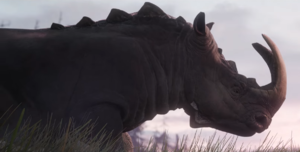Brontothere: Difference between revisions
From Halopedia, the Halo wiki
Sombraptor (talk | contribs) m (→History: Italicized Megacerops, as it is a genus) |
|||
| Line 8: | Line 8: | ||
Brontotheres lived in east [[Africa]] as late as [[97,445 BCE]].<ref name="HS37"/> They were among the creatures that were preserved as part of the [[Librarian]]'s [[Conservation Measure]].<ref name="HS37"/><ref name="HS2">''[[Halo: Silentium]]'', ''String 2''</ref> At one point during the [[Librarian]]'s last days on [[Earth]] before the [[Great Purification|firing]] of the [[Halo Array]], a two-meter high brontothere was one of the animals that approached her, nuzzling her hand.<ref name="HS37">''[[Halo: Silentium]]'', ''String 37''</ref> She surmised that they no longer had any fear since all the [[human]]s had been removed.<ref name="HS37"/> | Brontotheres lived in east [[Africa]] as late as [[97,445 BCE]].<ref name="HS37"/> They were among the creatures that were preserved as part of the [[Librarian]]'s [[Conservation Measure]].<ref name="HS37"/><ref name="HS2">''[[Halo: Silentium]]'', ''String 2''</ref> At one point during the [[Librarian]]'s last days on [[Earth]] before the [[Great Purification|firing]] of the [[Halo Array]], a two-meter high brontothere was one of the animals that approached her, nuzzling her hand.<ref name="HS37">''[[Halo: Silentium]]'', ''String 37''</ref> She surmised that they no longer had any fear since all the [[human]]s had been removed.<ref name="HS37"/> | ||
Thousands of years later, many brontotheres were encountered in [[2560]] on a [[Halo ring|Halo installation]], where they had evidently been [[Reintroduction|introduced]] following the [[Great Purification]].<ref name="HIT">''[[Halo Infinite]]'' [[Halo Infinite - E3 2018 - Announcement Trailer|reveal trailer]]</ref> These brontotheres resembled a species of [[Wikipedia:Megacerops|Megacerops]] that had seemingly evolved [[Wikipedia:Osteoderm|osteoderms]] under their jaws and along their backs.<ref name="HIT"/> | Thousands of years later, many brontotheres were encountered in [[2560]] on a [[Halo ring|Halo installation]], where they had evidently been [[Reintroduction|introduced]] following the [[Great Purification]].<ref name="HIT">''[[Halo Infinite]]'' [[Halo Infinite - E3 2018 - Announcement Trailer|reveal trailer]]</ref> These brontotheres resembled a species of ''[[Wikipedia:Megacerops|Megacerops]]'' that had seemingly evolved [[Wikipedia:Osteoderm|osteoderms]] under their jaws and along their backs.<ref name="HIT"/> | ||
==Behind the scenes== | ==Behind the scenes== | ||
Revision as of 21:49, December 15, 2018
- "How Riser's people would love to hunt you."
- — The Librarian thought of the diminutive florians when she laid eyes on a large brontothere.[1]

Brontotheres are perissodactyl mammals native to Earth.[1] They superficially resemble rhinoceroses but are distinguished by marked differences in their toes and horns.
History
- "A two-meter high brontothere nuzzles my hand, gentle but forceful, telling me I am out of place, perhaps I should move off somewhere and not bother this peaceable realm."
- — The Librarian shares her thoughts with a Catalog unit.[1]
Brontotheres lived in east Africa as late as 97,445 BCE.[1] They were among the creatures that were preserved as part of the Librarian's Conservation Measure.[1][2] At one point during the Librarian's last days on Earth before the firing of the Halo Array, a two-meter high brontothere was one of the animals that approached her, nuzzling her hand.[1] She surmised that they no longer had any fear since all the humans had been removed.[1]
Thousands of years later, many brontotheres were encountered in 2560 on a Halo installation, where they had evidently been introduced following the Great Purification.[3] These brontotheres resembled a species of Megacerops that had seemingly evolved osteoderms under their jaws and along their backs.[3]
Behind the scenes
Outside of the Halo universe, brontotheres are believed to have gone extinct around 33.9 million years ago, as opposed to still existing on Earth just around 100,000 years ago.
Gallery
Detailed view of a brontothere nostril.[3]
A brontothere begins to rise from bedding down in the grass.[3]
A herd of twenty-sixth century brontotheres.[3]
A herd of brontotheres on a Halo ring.[3]
List of appearances
- Halo: Silentium (First appearance)
- Halo Infinite
Sources
- ^ a b c d e f g Halo: Silentium, String 37
- ^ Halo: Silentium, String 2
- ^ a b c d e f Halo Infinite reveal trailer
![Detailed view of a brontothere nostril.[3]](https://halo.wiki.gallery/images/thumb/c/ca/Brontothere1.png/200px-Brontothere1.png)
![A brontothere begins to rise from bedding down in the grass.[3]](https://halo.wiki.gallery/images/thumb/1/1b/Brontothere2.png/200px-Brontothere2.png)
![A herd of twenty-sixth century brontotheres.[3]](https://halo.wiki.gallery/images/thumb/3/3d/Brontothere4.png/200px-Brontothere4.png)
![A herd of brontotheres on a Halo ring.[3]](https://halo.wiki.gallery/images/thumb/c/c3/Brontothere5.png/200px-Brontothere5.png)